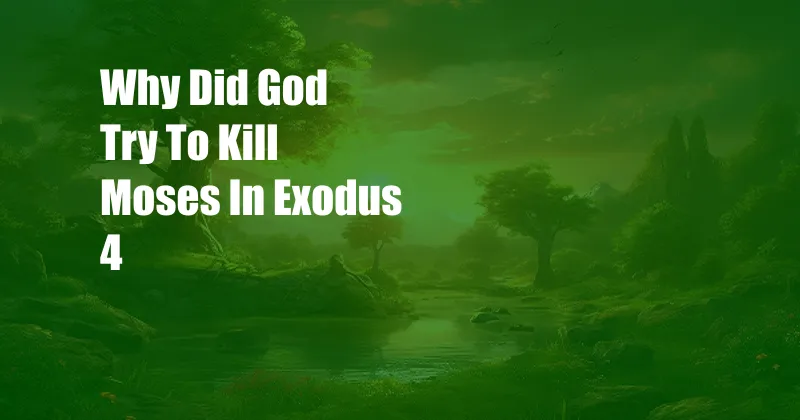
Why Did God Try to Kill Moses in Exodus 4?
In the biblical narrative of Exodus, the Lord encounters Moses at a burning bush and commands him to lead the Israelites out of Egypt. However, the text also recounts an enigmatic incident where God seemingly attempts to kill Moses. This episode, often referred to as the “Covenant of Circumcision,” has been the subject of extensive theological and historical debate.
The incident unfolds in Exodus 4:24-26, where God confronts Moses at an inn or encampment. The text states that “the Lord met him and sought to kill him.” Moses’ wife, Zipporah, intervenes by circumcising their son, Gershom, and touching Moses’ feet with the bloody foreskin. The Lord then relents and spares Moses’ life.
The Covenant of Circumcision
The Covenant of Circumcision, as it is often termed, holds significant theological implications. Circumcision was a ritual practiced by the Israelites as a sign of their covenant with God. By circumcising their sons, they were acknowledging their obedience to God’s commands and their acceptance of his protection.
In the context of this narrative, the circumcision of Gershom can be seen as an act of submission and recognition of God’s authority. By performing this ritual, Zipporah and Moses were affirming their commitment to the covenant and seeking God’s protection for themselves and their family.
God’s Anger and Moses’ Resistance
The reason for God’s initial anger towards Moses remains a subject of debate. Some scholars suggest that Moses was reluctant to obey God’s command to lead the Israelites out of Egypt. His hesitation, borne out of fear or doubt, may have angered God.
Others argue that Moses’ failure to circumcise his son, as commanded by God, was the catalyst for the divine wrath. Circumcision was a sacred ritual that symbolized the covenant between God and his people, and Moses’ neglect of this obligation may have been perceived as an act of disobedience.
Zipporah’s Intervention
The intervention of Zipporah, Moses’ wife, plays a pivotal role in the resolution of this episode. By circumcising their son, Zipporah not only fulfills the covenant obligation but also demonstrates her faith and her support for Moses’ mission.
Her actions appease God’s anger and save Moses’ life. This moment highlights the importance of obedience, humility, and the power of intercessory prayer in the face of divine judgment.
Contemporary Interpretations and Lessons
The Covenant of Circumcision continues to be a subject of theological exploration and debate. Modern interpretations of this episode often emphasize the themes of obedience, submission to divine authority, and the importance of family and tradition.
Some scholars have suggested that the narrative serves as a cautionary tale about the consequences of disobedience and the importance of fulfilling one’s covenantal obligations. Others view the episode as a reflection of the complexities of human nature and the struggles that individuals may face in the process of spiritual growth and maturation.
Tips for Understanding the Narrative
- Consider the historical context of the events, including the significance of circumcision in ancient Israelite society.
- Study the surrounding verses in Exodus 4 to gain a fuller understanding of the narrative flow.
- Examine the different interpretations and perspectives offered by theologians and biblical scholars.
- Reflect on your own experiences and beliefs in relation to the themes of obedience, submission, and divine judgment.
- Engage in discussions or forums to exchange ideas and gain insights from others.
Expert Advice
- “The Covenant of Circumcision is a profound reminder of our human frailty and the importance of seeking forgiveness and reconciliation when we fall short.” – Rabbi David Wolpe
- “The narrative highlights the transformative power of obedience and submission to God’s will.” – Professor Jennifer Davis
- “Zipporah’s role as an intercessor demonstrates the vital role that family and support systems play in our spiritual lives.” – Pastor Mark Driscoll
FAQ
Q: Why did God try to kill Moses?
A: The text does not explicitly state the reason, but possible explanations include Moses’ reluctance to obey God’s command or his failure to circumcise his son.
Q: What is the significance of the Covenant of Circumcision?
A: The covenant symbolizes the relationship between God and his people, emphasizing obedience, submission, and the importance of family and tradition.
Q: What lessons can we learn from this narrative?
A: Lessons include the importance of obedience, the power of intercessory prayer, the need for forgiveness, and the transformative nature of spiritual growth.
Q: How does the narrative relate to my own faith and experiences?
A: The themes of obedience, submission, and divine judgment are universal and can resonate with individuals regardless of their religious beliefs or experiences.
Conclusion
The enigmatic incident of the Covenant of Circumcision in Exodus 4 provides a compelling lens through which to explore the themes of obedience, submission, and divine judgment. By examining the biblical text, historical context, and various interpretations, we can gain a deeper understanding of this complex narrative and its relevance to our own spiritual journeys.
Whether you are a person of faith or simply curious about the complexities of human nature, I invite you to delve deeper into this fascinating story and its profound implications. Its lessons continue to resonate throughout history, offering guidance and inspiration for those seeking to navigate the challenges of life and grow in our relationship with the divine.